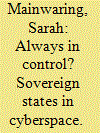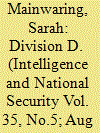| Srl | Item |
| 1 |
ID:
173365


|
|
|
|
|
| Summary/Abstract |
For well over twenty years, we have witnessed an intriguing debate about the nature of cyberspace. Used for everything from communication to commerce, it has transformed the way individuals and societies live. But how has it impacted the sovereignty of states? An initial wave of scholars argued that it had dramatically diminished centralised control by states, helped by a tidal wave of globalisation and freedom. These libertarian claims were considerable. More recently, a new wave of writing has argued that states have begun to recover control in cyberspace, focusing on either the police work of authoritarian regimes or the revelations of Edward Snowden. Both claims were wide of the mark. By contrast, this article argues that we have often misunderstood the materiality of cyberspace and its consequences for control. It not only challenges the libertarian narrative of freedom, it suggests that the anarchic imaginary of the Internet as a ‘Wild West’ was deliberately promoted by states in order to distract from the reality. The Internet, like previous forms of electronic connectivity, consists mostly of a physical infrastructure located in specific geographies and jurisdictions. Rather than circumscribing sovereignty, it has offered centralised authority new ways of conducting statecraft. Indeed, the Internet, high-speed computing, and voice recognition were all the result of security research by a single information hegemon and therefore it has always been in control.
|
|
|
|
|
|
|
|
|
|
|
|
|
|
|
|
| 2 |
ID:
172918


|
|
|
|
|
| Summary/Abstract |
The CIA is a popular topic of study for intelligence historians. Renowned for covert action and human intelligence operations, we know a lot about how they became woven into the tapestry of world history. More recently, scientific and technical intelligence emerged as a central theme, uncovering the work of the ‘Wizards of Langley’. This article suggests we still have much to learn. Exploring CIA’s historic interest in communications intelligence, it uncovers ways they controlled a significant proportion of the world’s communications systems. Working internationally, and disagreeing with NSA, the CIA influenced important systems well into the twenty-first century.
|
|
|
|
|
|
|
|
|
|
|
|
|
|
|
|